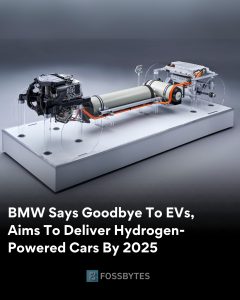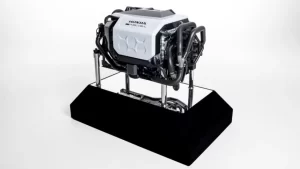
Three Car Manufactures Move to Hydrogen Engines.
BMW Says Goodbye to EVs, Aims to Deliver Hydrogen Powered Cars by 2025.
 BMW is strategically pivoting its attention towards hydrogen fuel cell vehicles, recognizing them as a pivotal player in the future landscape of automobile transportation. While electric vehicles (EVs) have traditionally taken centre stage as the primary focus for zero-emission car manufacturers, hydrogen vehicles, powered by fuel cells that emit only water vapor as a byproduct, are increasingly garnering attention for their sustainability credentials.
BMW is strategically pivoting its attention towards hydrogen fuel cell vehicles, recognizing them as a pivotal player in the future landscape of automobile transportation. While electric vehicles (EVs) have traditionally taken centre stage as the primary focus for zero-emission car manufacturers, hydrogen vehicles, powered by fuel cells that emit only water vapor as a byproduct, are increasingly garnering attention for their sustainability credentials.
In a bold move, BMW’s CEO, Oliver Zipse, has asserted that hydrogen engines are poised to play a crucial and influential role on a global scale in the long term. The company is actively working towards materializing this vision and has set an ambitious target of delivering hydrogen-powered cars to the market by 2025.
As a tangible manifestation of this commitment, BMW is gearing up to unveil the BMW iX5 Hydrogen in 2024. This groundbreaking vehicle is anticipated to redefine the landscape of sustainable transportation with its innovative features. Among its key attributes, the iX5 Hydrogen is designed to offer rapid refuelling capabilities, ensuring a seamless and efficient experience for users. Additionally, the vehicle promises a consistent driving range, addressing one of the common concerns associated with alternative fuel vehicles. Furthermore, BMW aims to match the performance levels of traditional electric vehicles (EVs), emphasizing that the transition to hydrogen-powered cars does not necessitate compromising on driving experience.
In essence, BMW’s strategic shift towards hydrogen fuel cell vehicles underscores a comprehensive and forward-thinking approach to sustainable mobility. By diversifying its zero-emission portfolio and embracing hydrogen technology, BMW is positioning itself at the forefront of innovation, contributing to the evolution of cleaner and greener transportation solutions. The imminent debut of the BMW iX5 Hydrogen represents a tangible milestone in this journey, signalling the company’s commitment to driving positive change in the automotive industry.
Honda and GM unveil the latest Hydrogen Engines, suggesting a potential shift away from Electric Cars
GM and Honda Join Forces to Advance Hydrogen Technology
 General Motors Co. (GM) and Honda Motor Co. (HMC) have made a significant stride in the realm of alternative energy with the unveiling of their pioneering joint venture, Fuel Cell System Manufacturing (FCSM). This collaborative endeavour, underpinned by an impressive $85 million investment, has resulted in the establishment of a state-of-the-art facility in Michigan, spanning an extensive 70,000 square feet. This facility is poised to be a game-changer in the landscape of hydrogen engine development, heralding a potential departure from the dominance of electric vehicles.
General Motors Co. (GM) and Honda Motor Co. (HMC) have made a significant stride in the realm of alternative energy with the unveiling of their pioneering joint venture, Fuel Cell System Manufacturing (FCSM). This collaborative endeavour, underpinned by an impressive $85 million investment, has resulted in the establishment of a state-of-the-art facility in Michigan, spanning an extensive 70,000 square feet. This facility is poised to be a game-changer in the landscape of hydrogen engine development, heralding a potential departure from the dominance of electric vehicles.
The cornerstone of this historic partnership lies in the commitment to advancing hydrogen fuel cell production, addressing the escalating demand for eco-friendly and zero-emission energy solutions. The shared vision of GM and Honda is encapsulated in FCSM’s mission to bring about a paradigm shift in the dynamics of sustainable transportation. This collaboration places a deliberate emphasis on enhancing performance, bolstering durability, and streamlining manufacturing processes, all of which are crucial elements in steering the automotive industry towards a greener and more sustainable future.
With an equal 50-50 partnership, the joint venture’s focus on the large-scale production of hydrogen fuel cells is poised to reshape the narrative surrounding alternative energy sources. The significant financial backing of $85 million underscores the seriousness of their commitment and the ambition to establish FCSM as a cornerstone in the evolution of hydrogen-powered vehicles.
The dedicated facility in Michigan is not merely a manufacturing unit; it represents a nexus of innovation, research, and development. By delving into the production of hydrogen fuel cells on a grand scale, GM and Honda aim to address the pressing need for efficient and environmentally friendly transportation solutions. This venture stands as a testament to their collective dedication to sustainability and the pursuit of cutting-edge technologies.
One notable outcome of this collaboration is the imminent introduction of hydrogen-powered vehicles, with the Fuel Cell System Manufacturing poised to bring the hydrogen-powered CR-V to the streets. This marks a significant step beyond the conventional electric vehicle narrative, suggesting a potential diversification in the automotive market and a move towards embracing hydrogen as a viable and impactful alternative.
As Fuel Cell System Manufacturing takes centre stage, the automotive industry and consumers alike can anticipate not just a shift in powertrain technology but a broader vision beyond vehicles. GM and Honda are positioning themselves as pioneers not only in vehicular propulsion but as contributors to a more sustainable energy landscape. The $85 million investment serves as a catalyst for research and development, pushing the boundaries of hydrogen fuel cell technology and inspiring a vision that extends beyond the confines of the automotive sector.
In the unfolding narrative of Fuel Cell System Manufacturing, the comparison between fuel cells and battery-electric vehicles becomes a focal point. The joint venture’s commitment to increased performance and durability, coupled with a strategic focus on reducing manufacturing costs, raises intriguing questions about the future trajectory of sustainable transportation. While electric vehicles have dominated recent discussions, the emergence of FCSM suggests that hydrogen-powered vehicles might play a more significant role in the eco-conscious automotive landscape.
In conclusion, the GM and Honda joint venture, Fuel Cell System Manufacturing, is not merely a collaborative effort in hydrogen fuel cell production but a pivotal milestone in the evolution of sustainable transportation. With its ambitious goals, substantial investment, and focus on innovation, FCSM has the potential to reshape the automotive industry’s approach to alternative energy, offering a compelling alternative to the prevailing electric vehicle narrative.




